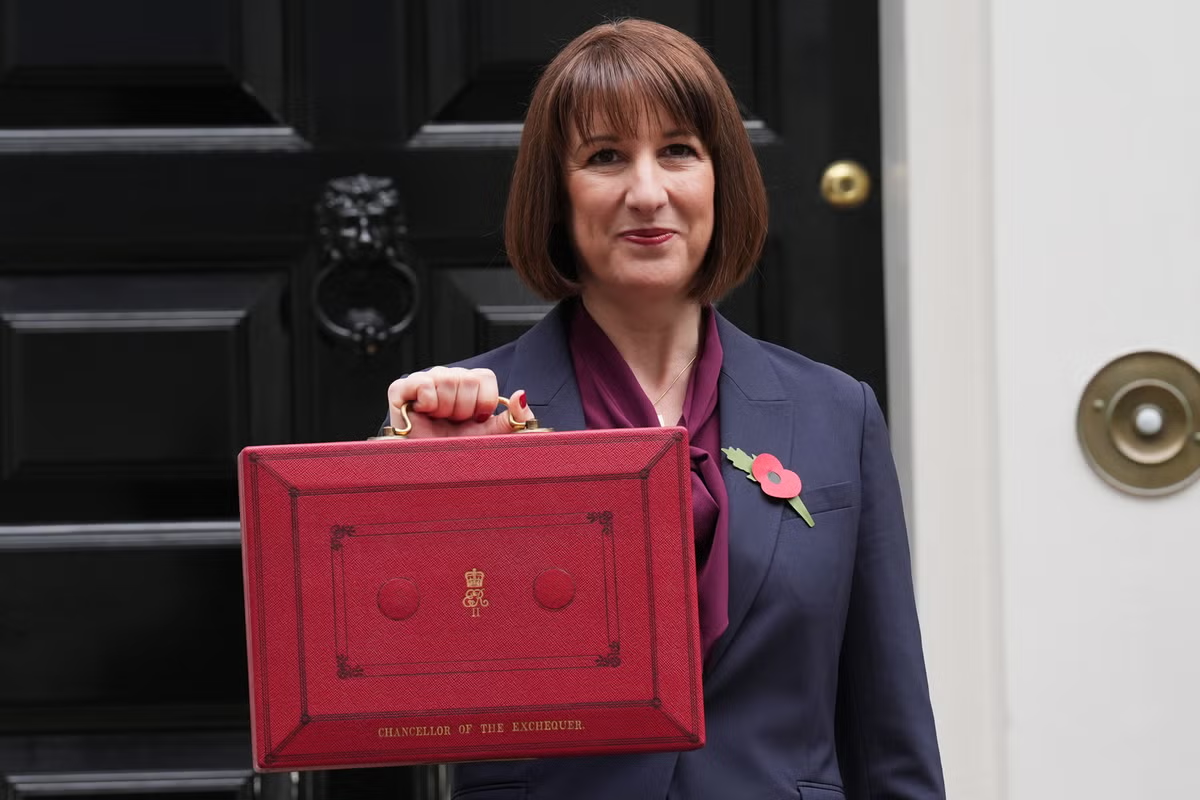Rachel Reeves warned of growth crisis before make-or-break Budget

Sign up to our free Brexit newsletter for our analysis of the continuing impact of Brexit on the UK
Sign up to our free newsletter for the latest analysis on Brexit’s impact
Sign up to our free newsletter for the latest analysis on Brexit’s impact
Rachel Reeves’s Budget has been plunged into another crisis just as she prepares to unveil it, with reports that efforts to kickstart the economy with growth have stalled.
The chancellor is set to deliver her second Budget on Wednesday, but Britain’s leading economic watchdog, the Office for Budget Responsibility (OBR), has reportedly downgraded its forecasts for economic growth until 2029.
It came as the business secretary, Peter Kyle, admitted the country was locked in a “growth emergency” as business leaders at the annual Confederation of British Industry (CBI) conference told him they faced “death by a thousand taxes”.
The projections from the OBR are expected to be the most pessimistic since it was set up 15 years ago in the wake of the banking crisis, and they come despite strenuous efforts by Ms Reeves to persuade the watchdog not to downgrade its estimates.
The news could not come at a worse time for the chancellor, whose own job is believed to be on the line – just 18 months after she arrived in the Treasury with a “number one mission” of growing the economy.
So bad are the figures that in a speech to Labour MPs on Monday night, the chancellor did not mention the word “growth” and replaced it with “fairness” and a promise to tackle the cost of living.
Experts have also piled on the pressure, warning that widely predicted measures – including a form of mansion tax on high-value properties, and a bank levy – will further harm growth.
open image in gallery
Peter Kyle addressing the CBI at a conference on Monday (Getty)
It also emerged that the Treasury is losing up to £90bn in tax revenue a year due to the economic impact of Brexit, according to a new analysis by the House of Commons library, based on research by the National Bureau of Economic Research, a US think tank.
The gloom was summed up by the results of a More in Common poll of more than 2,000 UK voters that gives Sir Keir Starmer an approval rating of -51 rating, and Ms Reeves -52. Worse, 68 per cent wished Rishi Sunak was still in charge 18 months after the Tories’ record defeat, and 67 per cent wanted Ms Reeves to cut spending instead of hiking taxes when she plans to do the opposite.
In an address to the CBI conference in Westminster, Mr Kyle said: “I really think we have inherited growth emergency, and we are still in it, and we will be in it for as long as we are unable to get our way out of this situation without increased economic productivity.”
But he later claimed there was “a lot of reason for optimism” over the economy, citing changes to the planning system that would, for instance, support Heathrow expansion, as well as the post-Brexit reset deal with the EU and the expanded “global talent” visa.
In her speech, CBI director general Rain Newton-Smith issued a challenge to the government: “If you really believe in economic growth, prove it.” Instead of producing economic growth, businesses were facing “death by a thousand taxes”, she warned.
Helen Miller, director of the Institute for Fiscal Studies, said Ms Reeves risked “increasing taxes that are bad for growth”, telling Times Radio that “investors will be nervous” if they see a list of tax increases. “The danger is that if you do lots of small things, often our smaller taxes are particularly badly designed and therefore you can end up increasing taxes that are bad for growth. Investors will be nervous if they see a list of tax increases, but don’t quite trust how much revenue it will bring in.”
And the Scottish Labour leader, Anas Sarwar, writing in The Independent, said Ms Reeves should use her Budget to “restore confidence and put this Labour government back on track”.
open image in gallery
Starmer and Reeves both have negative approval ratings ahead of the Budget (PA)
Tory leader Kemi Badenoch sought to capitalise on Labour’s woes. She accused Ms Reeves of preparing to announce tax rises “dressed up as necessities”, adding: “They are not. We need to cut spending.” She also called on her to make “one easy cost-free decision (and)… scrap the Employment Rights Bill”.
Ed Davey, the Lib Dem leader, said the new Brexit figures showed “why we have the highest taxes ever, why we have sky-high bills, why we have a cost of living crisis” as he called on Labour to fix “our broken relationship with Europe” in the wake of the Budget.
Ms Reeves is reportedly set to impose a new mansion tax on more than 100,000 high-value properties as she seeks to raise money to fill the financial black hole. She is expected to apply a tax to homes worth more than £2m in a move which could raise between £400m and £450m for the Treasury.
Speaking to the Parliamentary Labour Party, Ms Reeves did not use the word “growth” once as she gave a rallying call ahead of the Budget.
She told them: “The Budget on Wednesday will be about three priorities: cutting the cost of living, cutting NHS waiting lists and cutting the cost of debt.
“Cutting the cost of living was the thing that we all campaigned on, because we know that inflation reaching double digits, interest rates going through the roof, the economic instability under the previous government cost all our constituents dearly. “
She concluded: “On Wednesday, this will be a fair Budget. It will be a Budget that delivers strong foundations, secures our future and delivers on our promise of change.”
The OBR will publish its latest forecasts following the chancellor’s Budget speech, with sources telling Sky News that it would downgrade its growth predictions for 2026 and for the remaining years of the current parliament. The downgrade is a result of a drop in expected productivity in the UK as part of a readjustment of previously incorrect estimates. However, Ms Reeves’s own moves will also be blamed, including imposing a hike in employer national insurance contributions in what has been dubbed “the jobs tax”.
The Treasury has said it will not comment on speculation and leaks.





